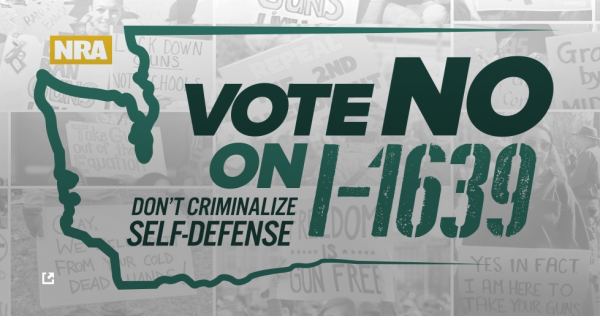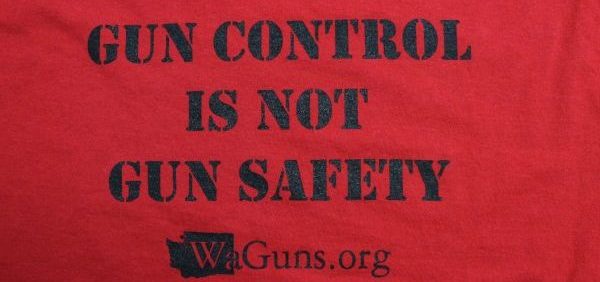
In the wake of a bad news survey of a small sampling of registered Washington voters, Crosscut reported that 59 percent plan to vote for gun control Initiative 1639, bringing an immediate surge of activism among opponents of the measure.
Social media, especially Facebook pages involved in the battle to defeat the 30-page initiative, shows an intensified vigor among rights activists. They are ringing doorbells, putting up yard signs and even larger roadside posters, distributing literature and making phone-banking to reach voters.
The survey, from among 405 registered Washington voters, according to Crosscut, has a margin of error of plus/minus five percent. Even in a worst case scenario, if the survey results are correct—and a lot of gun owners do not believe that—the odds seem long against defeating the restrictive gun control measure.
Writing for the Seattle P-I.com, veteran political journalist Joel Connelly, who continues to refer to I-1639 as a “gun safety” measure, noted that the survey was taken by Stuart Elway Oct. 4-9. But this is no “safety” measure, say initiative critics. It is purely the most restrictive gun control measure faced by voters anywhere in the country, opposed by the four biggest law enforcement organizations in the state: the Washington State Patrol Troopers Association (WSPTA), Washington State Sheriff’s Association (WSSA), Washington Council of Police & Sheriffs (WACOPS) and Washington State Law Enforcement Firearms Instructors Association (WSLEFIA).

While most Washington media has suspiciously avoided sharing this information, Crosscut did mention it, but only while quoting someone else who made sure the publication knew about this.
If passed, I-1639 will prohibit sales of so-called “semiautomatic assault rifles” to young adults ages 18-20. But that broad definition includes every semiautomatic rifle ever manufactured, including popular hunting rifles and .22-caliber self-loaders.
As noted by Connelly, “It would raise the minimum age to buy a semi-automatic firearm from 18 to 21 years old. It would also require the buyer of such a gun to pass an enhanced background check similar to the one required for handguns, take a firearms training course and then wait 10 days before purchasing the weapon.”
However, not mentioned is the requirement of Section 7, on the bottom of Page 12:
“A signed application to purchase a pistol or semiautomatic assault rifle shall constitute a waiver of confidentiality and written request that the health care authority, mental health institutions, and other health care facilities release, to an inquiring court or law enforcement agency, information relevant to the applicant’s eligibility to purchase a pistol or semiautomatic assault rifle to an inquiring court or law enforcement agency.”—Initiative 1639
The initiative, say critics, could also criminalize being a crime victim. If a gun is stolen or used by some “unauthorized person” to commit a crime, the owner of that gun could face felony charges if it is determined that the firearm was not stored safely.
Critics, including the National Rifle Association, contend this mandate requires gun buyers to sign away their medical privacy. They contend this constitutes a violation of the federal Health Insurance Portability and Accountability Act (HIPAA) of 1996.
Many of those same critics argue that it might violate the 14th Amendment rights of equal protection for young adults by stripping them of a right they have enjoyed for decades, since the age of majority was lowered to 18.
The ten-day waiting period is also contested by I-1639 opponents as burdensome on the exercise of a constitutionally-delineated right. They ask initiative supporters to identify any other right they would be willing to wait ten days before the government says they can exercise it.
If the measure passes, gun buyers would be warned about the “dangers” of having firearms in the home by this notice:
“CAUTION: The presence of a firearm in the home has been associated with an increased risk of death to self and others, including an increased risk of suicide, death during domestic violence incidents, and unintentional deaths to children and others.”—Initiative 1639
Buyers would be required to pay a $25 fee for the additional paperwork related to the so-called “enhanced background check” required to purchase a semi-auto rifle. Critics call this a hidden tax on the exercise of a constitutional right, akin to an unconstitutional poll tax.
Buyers would need to show proof of completing a safety course within the previous five years. Critics equate this to an unconstitutional literacy test that was once used to prevent minorities from voting.
Grassroots activists have been reminded that they have a daunting task. Ballots are appearing in mailboxes. The challenge is getting people to vote “NO” and then actually return their mail-in ballots. Their effort so far has been impressive, and some would describe it as massive. But they are up against a handful of billionaires and wealthy elitists; people they believe are convinced the constitution is for sale.